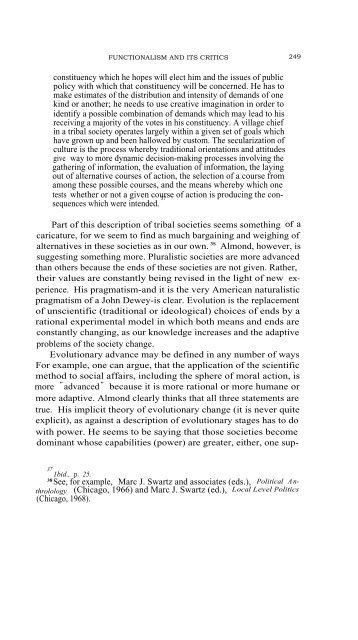FUNCTIONALISM AND ITS CRITICS - Intercollegiate Studies Institute
FUNCTIONALISM AND ITS CRITICS - Intercollegiate Studies Institute
FUNCTIONALISM AND ITS CRITICS - Intercollegiate Studies Institute
You also want an ePaper? Increase the reach of your titles
YUMPU automatically turns print PDFs into web optimized ePapers that Google loves.
<strong>FUNCTIONALISM</strong> <strong>AND</strong> <strong>ITS</strong> <strong>CRITICS</strong><br />
constituency which he hopes will elect him and the issues of public<br />
policy with which that constituency will be concerned. He has to<br />
make estimates of the distribution and intensity of demands of one<br />
kind or another; he needs to use creative imagination in order to<br />
identify a possible combination of demands which may lead to his<br />
receiving a majority of the votes in his constituency. A village chief<br />
in a tribal society operates largely within a given set of goals which<br />
have grown up and been hallowed by custom. The secularization of<br />
culture is the process whereby traditional orientations and attitudes<br />
give way to more dynamic decision-making processes involving the<br />
gathering of information, the evaluation of information, the laying<br />
out of alternative courses of action, the selection of a course from<br />
among these possible courses, and the means whereby which one<br />
tests whether or not a given course of action is producing the consequences<br />
which were intended. 37<br />
Part of this description of tribal societies seems something of a<br />
caricature, for we seem to find as much bargaining and weighing of<br />
alternatives in these societies as in our own. 3S Almond, however, is<br />
suggesting something more. Pluralistic societies are more advanced<br />
than others because the ends of these societies are not given. Rather,<br />
their values are constantly being revised in the light of new experience.<br />
His pragmatism-and it is the very American naturalistic<br />
pragmatism of a John Dewey-is clear. Evolution is the replacement<br />
of unscientific (traditional or ideological) choices of ends by a<br />
rational experimental model in which both means and ends are<br />
constantly changing, as our knowledge increases and the adaptive<br />
problems of the society change.<br />
Evolutionary advance may be defined in any number of ways<br />
For example, one can argue, that the application of the scientific<br />
method to social affairs, including the sphere of moral action, is<br />
more " advanced " because it is more rational or more humane or<br />
more adaptive. Almond clearly thinks that all three statements are<br />
true. His implicit theory of evolutionary change (it is never quite<br />
explicit), as against a description of evolutionary stages has to do<br />
with power. He seems to be saying that those societies become<br />
dominant whose capabilities (power) are greater, either, one sup-<br />
37 1bid., p. 25.<br />
38 See, for example, Marc J. Swartz and associates (eds.), Political Anthrolology<br />
(Chicago, 1966) and Marc J. Swartz (ed.), Local Level Politics<br />
(Chicago, 1968).<br />
249
















